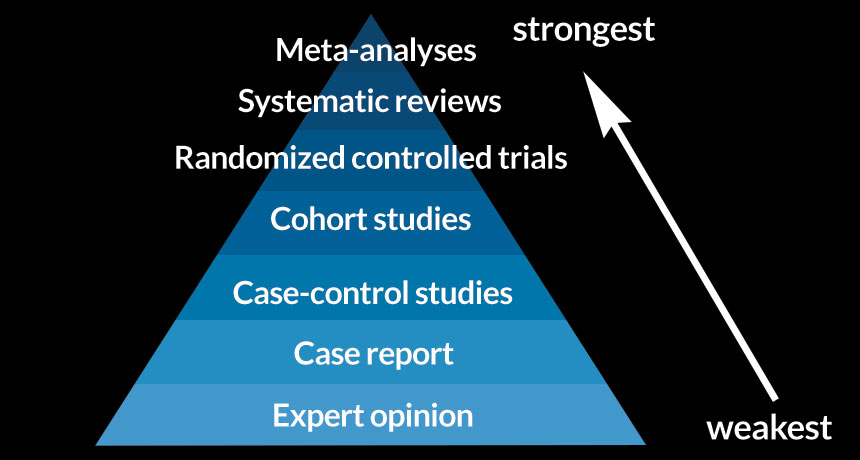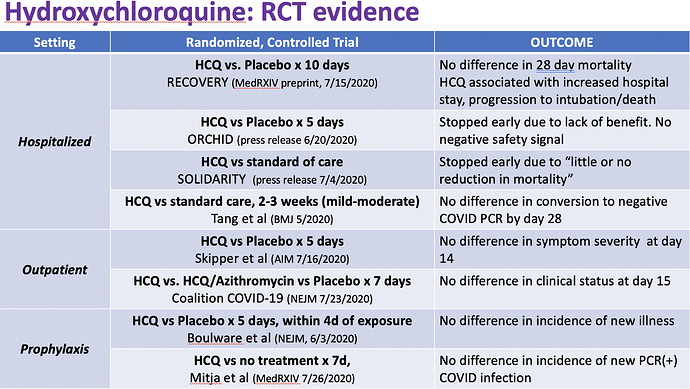In reference to the June 5th post on hydroxychloroquine where it was claimed that no significant health response was indicated how do we explain the reports coming from Texas where they claim 100% recovery for patients who are treated with it? If the reports are true, please Dr. Collins our country needs your help!
Welcome @Allen. Can you give a citation please? I also appreciate @glipsnort’s observation earlier that with the state of early studies on Covid, lots of observations are crappy and misleading…perhaps through no bad intent. Bogus papers in bona fide science journals? - #4 by glipsnort
It is difficult to sift through the chaff.
At any rate, welcome and thanks for adding to our conversation.
Hey Randy,
Thanks for your patience. I’m new to Biologos. Here’s the link I watched today on Linkedin: Sign Up | LinkedIn
Thanks for the link, @Allen. Thanks to you too, @glipsnort. It is a good summary.
I feel like I have to apologize to you on behalf of family physicians for the antics of the “Frontline Doctors.” I am a family physician and feel their hubris and naivete reflects extremely poorly on physicians in general. I thoroughly think if we practice outside our scope and with no scientific basis, we are endangering people’s lives and deserve discipline…but it is a temptation in this difficult time.
I suppose we are all at the mercy of the news we watch. Randy, I respect you as a physician and will continue to try to sift through all the media and make up my mind about the ‘truth’. I only watched the doctor from Nigeria and was impressed with her statistics and passion. I was a little taken aback by the Politofact stuff about alien DNA and such. Oh boy…what an age we live in.
Personally, I am thinking of trying a combination of equal parts quinine carbonic acid solution and 40% ethanol with herbal extractions. Preferably on the rocks. 
They didn’t even mention half the nutty stuff she has said.
Also that group of doctors sounds like it is a professional medical association of doctors treating COVID-19, but it’s not. The “leadership” team of the America’s Frontline Doctors group includes ophthalmologists, an orthopaedic surgeon and a psychiatrist. Few of the doctors in the video are actually treating COVID patients, they just put on lab coats for a photo op. The founder of the group Dr. Simone Gold, was fired after making that video (censorship or professional malpractice, depending on your narrative)
Allen, first let me say welcome to the forum. I think this is a really good place to discuss such topics, as so long as participants are sincere in their quest for answers, I think you can get honest and sincere responses to the questions posed.
While others have given you great information, I will throw my two bits in also. I am also a family doc, recently retired, and have struggled with friends and family confused about these same questions. I think the advice to look at the source, to examine motivation, and examine creditials is very important in a case like this where the whole intent is to argue from an appeal to authority. In this case, the appeal to authority was so blatantly obvious that it was almost comical, except for the fact that a lot of people were deceived by it. The name of the group, Frontline Doctors, was chosen to give the impression that they were out working on the front lines of the war on Covid-19, and wanted to share their wealth of experience. The reality is that several were ophthalmologists who probably never saw a case, one had the questionable history related above, and main spokesperson who evidently was trained in ER medicine doesn’t practice ERMedicine, but from her resume appears to be involved more with political newsletters and has a concierge practice (How does an ERDoc have a concierge practice? ). None have training in infectious disease or epidemiology. They did get nice white coats made up with Frontline Doctors embroidered on them. I surprised they weren’t wearing stethoscopes to complete the act.
However, what I really want to touch on is your question, as it is very important and frequently asked:
In short, it is well known now that most people has either very mild symptoms, or perhaps none at all. The vast majority of patients do very well and fully recover with no treatment at all specific to the disease. In cases like this, it is very difficult for a doctor or a patient to know if a treatment works or not. One can be very sincere but also be very fooled by empirical observations unless careful to interpret them appropriately. We are wired to see associations and make connections, and that tendency served us well in avoiding poison berries and hunting food sources. However, we are easily deceived in thinking our actions resulted in a particular outcome when that outcome is likely to have occurred anyway. As the saying goes, correlation is not always causation.
In this case, as most get better anyway, large numbers of patients treated with strict controls to make sure they are comparable in risk and severity are needed to tell whether there is truly a benefit or risk to hydroxychloroquine. Most of these anecdotal reports involved few patients with uncontrolled risks. Doing studies is actually not an easy thing to do in the midst of a pandemic like this, so even the best studies thus far have to taken with a grain of salt as they are observational rather than double-blinded. In spite of the limitations, multiple studies have been done with the results looked at critically, and the overwhelming result has been to show no benefit.
Not knowing your background, I don’t know if that helps, is too simplistic or too complicated or whether it brings up more questions to be addressed, but is a place to start. We could look at some of the studies if desired to see what makes them good or bad if that would be helpful. Most have pretty good critiques online.
Factcheck.org is an excellent site. Here is their take on this story that has deceived so many:
In Viral Video, Doctor Falsely Touts Hydroxychloroquine as COVID-19 ‘Cure’
Gin and Tonic is the pandemic drink of choice. Of course, it didn’t keep the Brits from getting malaria …
I heard about this yesterday. If you want your herbal extractions from elephant butt.
That’s a headline I would’ve been proud to call my own! It’s also a reason not to buy expensive liquor. haha
Clearly, we simply needed to up the dosage! I propose a new study. Since researchers are so pressed for time in these dark days I’m willing to test the hypothesis on myself…
FOR SCIENCE! ![]()
Thanks Phil, This continues to be a learning experience. I really appreciate the tone and respect of visitors to the forum. A little levity and some very good responses.
Thanks for that. Sorry… I mistakenly assumed they were all like Dr Emmanuel. Oddly, the going thing in Covid is to not wear white coats (and only short sleeved shirts) to decrease contact transmission. That begs the question…what are white coats for anyway? It’s easier in summer to go without them.
I’d start by comparing the types of evidence we have. Something along these lines.
So let’s say you have a doctor claiming 300 patients cured using hydroxychloroquine (sure, she also claims demon sperm gives people various illnesses but let’s take just the I’ve cured 300 patients with HCQ). What kind of evidence would that be? Would it be maybe a case report? Or before we even see anything beyond one person’s word, it’s almost like an expert opinion. Let’s go with that. How would that compare to various randomized control trials.
So in light of something like this, how should we proceed? Certainly, I would argue, with caution in accepting one doctor’s claims. But let’s look at their claims a bit further.
It would not be unusual to see 300 patients (assuming you’re not an ER doctor) with COVID-19 and none of them die. The case fatality rate (out of detected cases) in Florida right now for example broken down by age group:
-
0-29: one out of every 2850
-
30-39: one out of every 704
-
40-49: one out of every 574
-
50-59: one out of every 189
-
60-69: one out of every 53
-
70-79: one out of every 16
-
80-89: one out of every 7
-
90+: one out of every 4
So if you treated 300 people with purple lollipops, how many would you expect to die?
On average, if you treated patients between 30-39, only one in every 704 would die. So you could easily treat 300 patients with purple lollipops, have none die, and claim that your treatment works. One out of every three purple lollipop advocates would see no deaths in 300 people. Or you could just send someone really sick to the ED, and then technically they didn’t die under your treatment protocol.
That is why you must demand to see the evidence. When someone claims they’ve treated X patients, you need them to write up a report. If they don’t have time or the statistical background or forgot all that stuff, find a researcher to help them. You need to know the background of the treatment group. If you have a control group, you should try to make that the same as the treatment group to try and control for these factors.
Beautiful job putting that together, Matthew. I may have to plagiarize it.
I just want to point out that there have been multiple double-blinded randomized control trials of hydroxychloroquine at this point.

